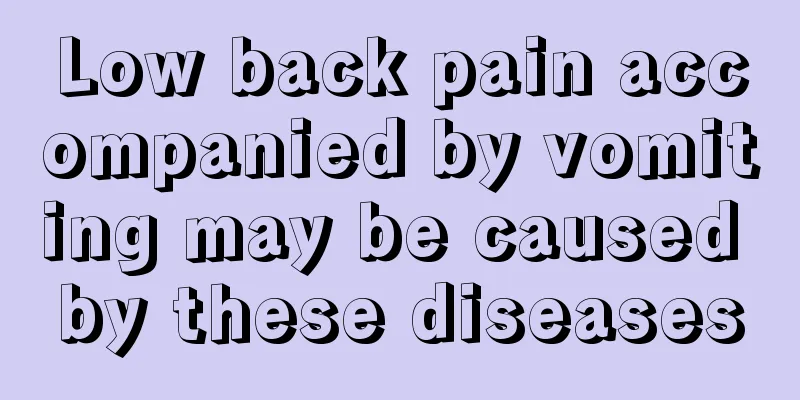Low back pain accompanied by vomiting may be caused by these diseases

|
In life, people often experience low back pain accompanied by nausea and vomiting, but it is difficult to determine the cause. In fact, many diseases such as lumbar disease, renal ischemia, nephritis, lumbar muscle strain and renal colic may be factors that cause this condition, so patients need to judge the cause according to their own condition and receive reasonable treatment. 1. It may be lumbar disease It is recommended to go to the orthopedic department for examination, make a clear diagnosis and treat the symptoms. In daily life, pay attention to rest, avoid weight on the waist, do not do large-scale waist rotation movements, etc. It is usually recommended to sleep on a hard bed. 1. Eat a balanced diet with high protein and vitamin content and low fat and cholesterol. Prevent obesity, quit smoking and control alcohol. 2. Pay attention to the combination of work and rest at work, have a correct posture, do not sit or stand for a long time, and do warm-up exercises before strenuous physical activities. 3. Rest in bed, it is advisable to use a hard bed to maintain the physiological curvature of the spine. 4. Avoid cold and keep warm 2. Renal ischemia and nephritis Low back pain may be caused by renal ischemia, nephritis, lumbar muscle strain, etc., but nephritis will have symptoms such as percussion pain in the kidney area and positive urine protein. Lumbar muscle strain is common and is aggravated after labor. In addition, for some cases of renal tuberculosis, it is recommended that you take a waist film, test urine routine, renal function, urine microalbumin, cystatin C, etc., pay attention to rest, and treat it after the cause is determined. 3. Renal colic If low back pain is accompanied by nausea and vomiting, it is generally necessary to highly suspect renal colic caused by kidney or ureteral stones. If you have pain on the right side of your waist, you may also have cholecystitis. Suggestions: It is recommended to go to the hospital for a liver, gallbladder, kidney, ureter B-ultrasound and urine routine examination. If it is confirmed to be renal colic, anti-inflammatory and antispasmodic treatment is generally required. Small stones can usually be naturally excreted from the body by drinking more water and exercising. |
<<: What causes lower abdominal cramps?
>>: What are the symptoms of Helicobacter pylori gastritis?
Recommend
What is the difference between the free and self-paid meningococcal vaccines
Self-paid vaccines mean that you have to pay for ...
What is sleep apnea syndrome
If it is said that someone stops breathing during...
What are the early characteristics of prostate cancer?
Among various cancers, everyone must have heard o...
What are the adverse reactions to leprosy vaccination
Leprosy is a serious disease, so in order to prev...
What are the classifications of cystitis
This disease is common in chronic urinary tract i...
How to educate children in the third year of high school
High school is a very important period in China&#...
What are the commonly used drugs after breast cancer bone metastasis? These drugs are essential
What are the commonly used drugs after breast can...
What are the specific symptoms of metastatic lung cancer? Three common symptoms of metastatic lung cancer
Metastatic lung cancer refers to the presence of ...
The role of cocoa powder
We sprinkle some cocoa powder on a lot of the cho...
How much hair loss is normal after washing your hair?
Hair loss is a very normal thing. Everyone loses ...
Central nervous system specific protein
Many people often encounter some inexplicable phy...
How to generally care for hamartoma
Everyone is terrified when hearing about cancer. ...
How hereditary is glioma
People's living conditions are better now tha...
Which hospital is best for treating bladder cancer
Bladder cancer is a malignant overgrowth of cells...
How to treat advanced esophageal cancer
The treatment of advanced esophageal cancer shoul...









